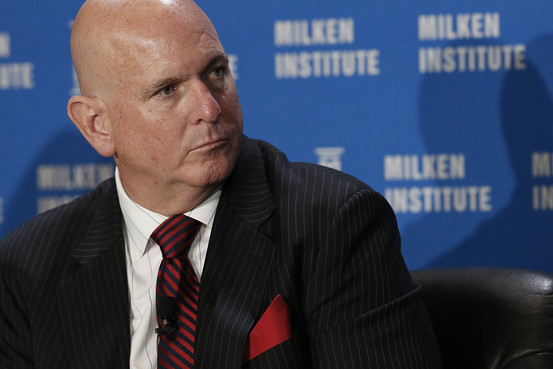
‘Justice for Tucker’ group confronts 70-year-old Elbridge grandmother accused … – The Post
June 11, 2014
Ten global consequences of the Ukraine crisis
June 21, 2014

Christopher Ailman, chief investment officer of California State Teachers’ Retirement System, listens during the Milken Institute Global Conference in Beverly Hills, California, earlier this year.
Bloomberg News
Some global investors say they are encouraged by Japanese Prime Minister Shinzo Abe’s steps to create a more corporate-friendly environment, while others remain cautious on his reforms.
Christopher Ailman is one of those taking a wary stance. In an interview with The Wall Street Journal, the chief investment officer at California State Teachers’ Retirement System says that while he is interested in Mr. Abe’s reforms, he isn’t ready to raise the fund’s Japan allocation to Overweight. The Sacramento-based pension fund, one of the largest in the U.S., manages $185 billion in assets and is Neutral on Japan.
Here are edited excerpts from the interview.
WSJ: What’s your view on Japanese economic reforms?
Mr. Ailman: We remain skeptical. We are very interested in the reforms and we are going to watch them.
We are one of the few remaining funds that still have home-country bias to the U.S., which has helped us tremendously in the last five years, but we are revisiting that. And one of the considerations really is Japan.
WSJ: Why are you skeptical?
Mr. Ailman: Changing behaviors is always very difficult. It is one thing to announce a reform and it’s another to get it fully implemented. And how it’s implemented and how people react to it is a very dynamic process.
Because we are conservative, we have more of a wait-and-see attitude to see if things really will take place and hold. Japan has a tremendous demographic wave working against it.
WSJ: Is demographics your main concern? Anything else?
Mr. Ailman: The cultural nature toward high savings rates, a generational shift in leadership at some of companies, life-long employment–there are a number of social fabric issues at play that challenge some of the reforms.
WSJ: What reforms do you want to see? Cuts in corporate tax? Improvement of corporate governance?
Mr. Ailman: We have always been pushing for a more robust corporate governance code in Japan. I think I remember going to Japan and doing a speech way back in about 2005 on corporate governance. That would no doubt help. But..I think for us what we would expect, and what we’d like to see is growth forecasts out of some of major corporations, particularly, the global manufacturing companies.
WSJ: Is the very idea of Japanese structural reform something of a joke?
Mr. Ailman: I don’t want to present that point of view at all. We do not view it as a joke at all. I think we just recognize the difficulty. Look at America and the difficulty in instituting significant structural reforms and changes. Obviously with Abenomics you’re beyond what’s in the textbook. You’re going into areas where even finance people are not quite certain how things will work. We’ve got to point a finger back at the U.S. The only way we improved our budget deficit was to go off a fiscal cliff.
Because we have other investment opportunities and we see other areas of growth, we can take a bit of a wait-and-see attitude. But for us (Japan is) the third most important nation in the investment world, so we are very anxious to see Japan break away and demonstrate some growth because we don’t think that Europe will really have a chance to grow much. And the same demographics are working against Europe.


